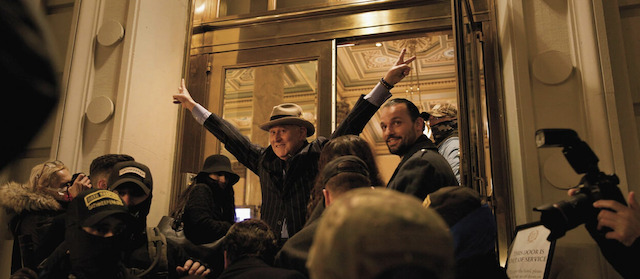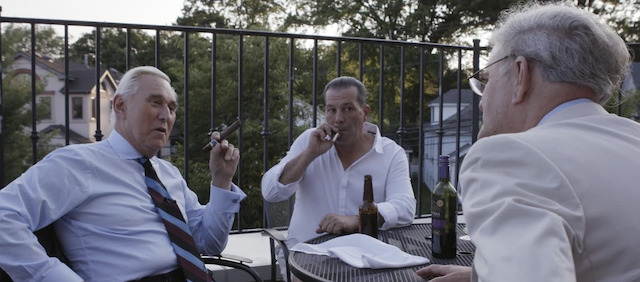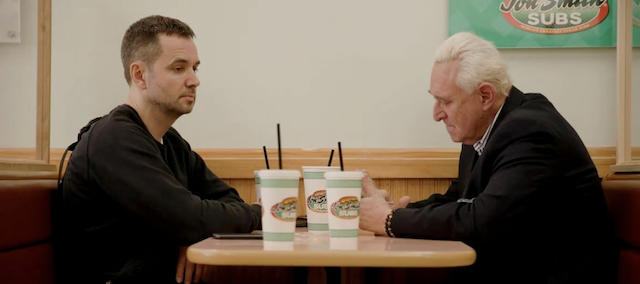
@Courtesy of Abramorama
Christoffer Guldbrandsen’s A Storm Foretold is a frightening exposé of the behind-the-scenes role Roger Stone played in the insurrection at the U.S. Capitol on January 6, 2021, just three years ago this week.
The Danish documentarian was able to spend time with Stone during the run-up to the insurrection, and what he captured on film is not pretty. As Guldbrandsen put it in his director’s statement, “we went on a wild ride through the halls of power,” a journey that revealed all the smouldering entrails of American carnage in the era of Donald Trump.
Guldbrandsen went on to bemoan the way citizen journalism and social media have failed to live up to their potential to undergird democratic ideals. Instead, he asserts, the new electronic media have spread misinformation and corrosive discourse, threatening the very foundations of democracy itself,
“Now [the Internet] has become the perfect place to overwhelm the truth,” he writes. “The loudest liar wins.”
 @Courtesy of Abramorama
@Courtesy of Abramorama
In A Storm Foretold, Guldbrandsen amply shows that one of the loudest liars out there—in addition to Donald Trump, of course—has been Roger Stone, the conservative analyst who has made raw aggression a leitmotif during his half-century career as a Republican strategist. Stone himself described his strategy in these terms: “Attack, attack, attack—and never defend” and “Admit nothing, deny everything, and launch a counterattack.”
An article in the March 4, 2022 issue of The Washington Post put it this way: “During his nearly half-century career as a Republican operative, Stone has made himself synonymous with the type of populist showmanship and scorched-earth political attacks that propelled Trump’s 2016 bid for the White House, for which Stone served as an informal adviser.”
As seen in this incisive documentary, Stone rivals Trump himself as a master of name-calling and invective. He is pictured, for example, making crude racist and anti-Semitic comments, blasting Mitch McConnell as having “an I.Q. of 70,” and denouncing John McCain as a war criminal, suggesting that the 45th president may have learned a thing or two about crudity from Stone.
The same Washington Post article claimed that Stone wanted to be paid for participating in the documentary, and that he initially objected to Guldbrandsen’s “fly-on-the-wall footage,” which captured Stone in candid phone calls with Michael Flynn, Alex Jones, and other key players in the run-up to the January 6 uprising.
“He didn’t want to do anything observational, where he lost control of the situation,” Guldbrandsen was quoted as saying. “He wanted interviews and staged situations, which of course from my perspective is very boring and uninteresting.”
 @Courtesy of Abramorama
@Courtesy of Abramorama
Some observers feel that Roger Stone’s role in the January 6 uprising has not received the attention it deserves, and Guldbrandsen’s film goes a long way toward setting the record straight. A Storm Foretold amply depicts a dyspeptic Stone engaged in his usual machinations. In addition to the conversations with Flynn and Jones, he is pictured in the infamous Willard Hotel meetings and is shown conniving with leaders of the Proud Boys and Oath Keepers.
Arguably the most interesting scene in the film comes on January 6 itself, when, in the heat of the insurrection, Trump rebuffs Stone’s pleas for pardoning some of their allies. Feeling angry and betrayed, Stone denounces Trump in a phone call to a colleague, suggesting that the former president be impeached again and directing a volley of “fuck these people” remarks against the Trump family.
This scene also reveals a vulnerability and softness about Stone that is perhaps surprising, given his take-no-prisoners combative personality. It only underscores the fact that Cristoffer Guldbrandsen has created a compelling documentary about a character that is more complex and nuanced than appears at first glance.
Though A Storm Foretold might be faulted for not offering enough background information about Stone’s lifelong activities to put his insurrectionist activities in context, this impressive documentary is yet another fervent testimony to the perilous state of American democracy at this crucial moment in history. If Guldbrandsen were Dickens, he might well have written “It is the worst of times, the worst of times.”
Rating A-
Check out more of Edward’s articles.
Here’s trailer of the film.

